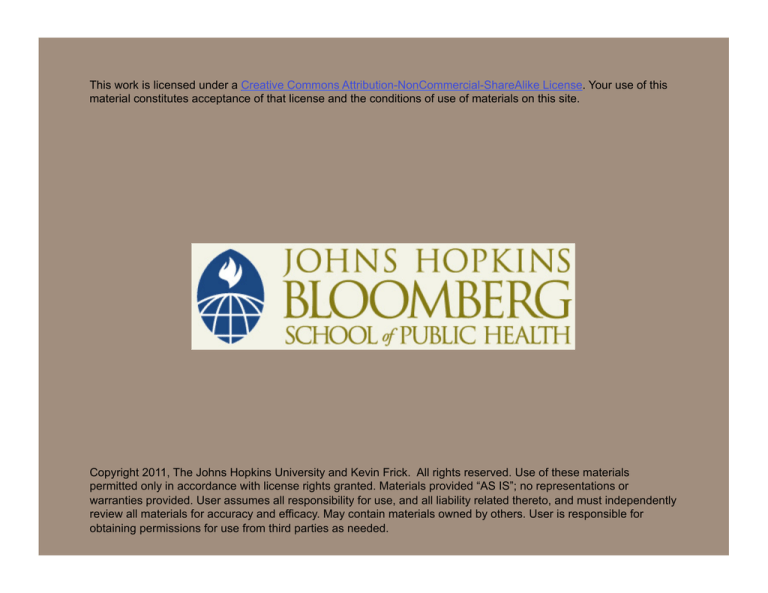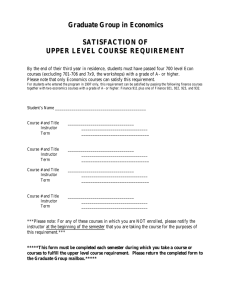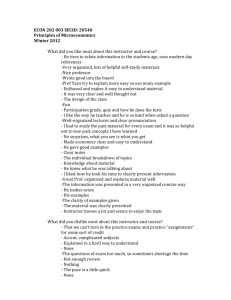
This work is licensed under a Creative Commons Attribution-NonCommercial-ShareAlike License. Your use of this
material constitutes acceptance of that license and the conditions of use of materials on this site.
Copyright 2011, The Johns Hopkins University and Kevin Frick. All rights reserved. Use of these materials
permitted only in accordance with license rights granted. Materials provided “AS IS”; no representations or
warranties provided. User assumes all responsibility for use, and all liability related thereto, and must independently
review all materials for accuracy and efficacy. May contain materials owned by others. User is responsible for
obtaining permissions for use from third parties as needed.
Course Introduction
Kevin Frick, PhD
Johns Hopkins University
Outline
Introduction to the instructor
Introduction to the course
Expectations
3
Introduction to the Instructor
Undergraduate training in health policy
Graduate training in economics and health services research
Entire career spent at the Johns Hopkins Bloomberg School of Public
Health
Some research on obesity
A lot of research on economics and cost-effectiveness
Teaching economics and cost-effectiveness
4
Introduction to the Course
Course began as an institute course
- Met the needs of offering something on economics in an
institute setting
-
-
Take a topic of popular interest in public health and interpret it
through an economic lens
Make a small number of economic concepts accessible to an
audience to learn the logic and intuition of the concept rather
than teaching a course focused on graphs and equations
5
Course Structure
Six brief lectures
Two LiveTalks
Practice policy analyses
Brief quizzes
Final assignment
6
Brief Lectures
Economics overview
Basic facts of obesity
Consumers, incentives, and weight
Limitations of consumer sovereignty
Who benefits from obesity
7
LiveTalks
Discuss more recent data on obesity
Discuss more local data on obesity
Consider policies that have been tried in different places
Analyze policies that have been tried in different places
Use the economic concepts and economic language to explain
behaviors we observe
Preceded by the use of a Wiki to prepare for the LiveTalk
8
Practice Policy Analyses
Consider a policy on your own rather than as part of a group Wiki or
the LiveTalk
Read the TA/instructor version of the same analysis
Compare
9
Quizzes
Recognition of the use of basic economic terminology
10
Expectations Regarding Feedback
Use the BBS to ask questions
- Ask early
Timely feedback on questions from TA/instructor
Timely feedback on assignments from TA/instructor
11
What to Do to Get a Good Grade?
Listen to all the lectures—this is a part of participation
Participate in (or at least listen to the archive for) all LiveTalks—this
is a part of participation
Participate in the brief small group assignment—this is a part of
participation
Try all the quizzes—also a part of participation
Try the practice policy analyses—this is not a part of the grade but
will be useful for getting a good grade on the final assignment
Do the final assignment on time
12





